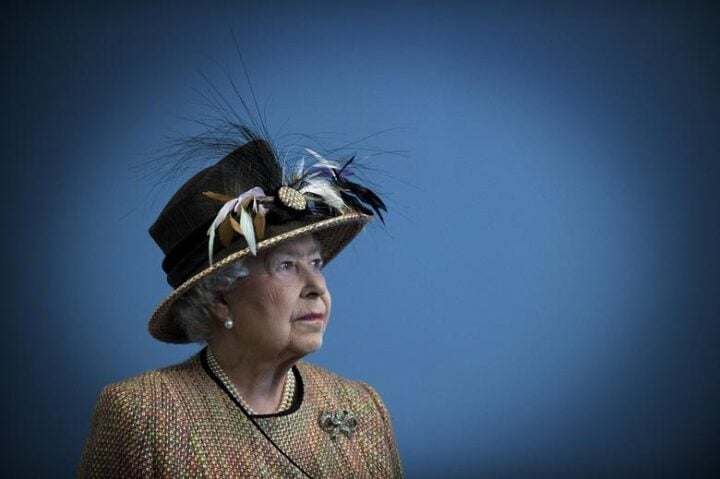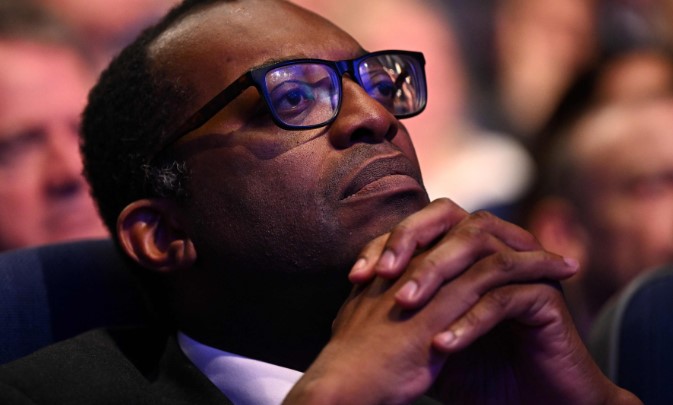Britain's Queen Elizabeth views the interior of the refurbished East Wing of Somerset House at King's College in London February 29, 2012. The Queen is celebrating her sixtieth anniversary as Regent in 2012. REUTERS/Eddie Mulholland/POOL (BRITAIN - Tags: ROYALS ENTERTAINMENT EDUCATION TPX IMAGES OF THE DAY)
Exactly one month ago, Queen Elizabeth II was buried at St. George’s Chapel within the grounds of Windsor Castle, one of her favourite homes and where 10 other royals have been laid to rest before her, leaving memories that may linger longer than the 96 years she was on this sphere.
Apart from walking on two legs like the rest of us, I have not seen her in the mould of a regular human. For those of you who thought the white witches had done their worse, autopsy report released by the palace indicated the Queen died of “old age” without “any identifiable disease or injury that contributed to the death.”
That lays to rest speculations that the white witches had done their worse as they did to her late husband, Prince Philip, who died April 9 last year, two months before he turned 100 years old.
But, on a serious note, the Late Queen Elizabeth II was arguably above the known pilaster where other mortals that co-existed with her operated.
Advertisement
From my record, no other creature combined every good element available to mankind into one frame like the Queen did. On this, I stand to be corrected.
I will attempt to list what I consider the basic desires which form the essential part of human life and which we all seek, at practically every stage of our lives. Some you may say are materialistic, some emotional.
In no particular order, we all want health, wealth, beauty, good relationships, success, comfort, fame and good progeny.
Advertisement
There are also spiritual desires. We want to know about life after death, about how to remain equanimous under all kinds of circumstances. In other words, we all want to be at peace.
Let us take a quick look at this uncommon woman and how she encapsulated these life’s fundamentals that clearly stood her apart from the rest of us.
One, she was beautiful, I mean very beautiful, by all standards of description.
Two, she was famous, more famous than every other person in history, at least in the last 70 years.
Advertisement
Three, she had power. She was the only sovereign person in Britain and the only one above the law.
She was also rich and wealthy, almost beyond imagination. And by that same measure, she was healthy.
In marriage, she was super successful, living a happy life with her husband, Prince Philip for 74 unbroken years.
She was loved by nearly the entire humanity.
Advertisement
In addition, she had a long life.
As if all these were not enough, she died peacefully without the usual pains from certain malignant sicknesses associated with old age; neither did she die of any degenerative disease. Something every human prays for.
Advertisement
Meaning, she actually lived and died without pains! As a matter of fact, Queen Elizabeth goes down in history as one individual who summarized, in my view, the hopes and dreams of all mortals across the entire human race.
The thought of that matchless bio-data came to me as news of her passing, late afternoon September 8, hit the world.
Advertisement
Moments after the announcement of the Queen’s death, I was on a walk around my country home when my son called my attention to a beautiful rainbow whose colours emblazoned the sky.
His association of this with the Queen’s passing few hours ago was same as mine. And a quick reminder that “When beggars die, there are no comets seen; the heavens themselves blaze forth the death of Princes” as William Shakespeare succinctly put it.
Advertisement
If that was a mere coincidence, as cynics might think, how do we explain the strange appearance of a little spider crawling over the Queen’s coffin as it was carried into Westminster Abbey? It was described as a good omen considering the fact that the Queen would have been happy, knowing how close she was with nature. But the mysticism, to me, lies in how a spider found its way into that setting.
Moving forward, Queen Elizabeth reigned and ruled for 70 years, the longest in Britain’s 1,200 years history of 62 monarchs. The second longest was her great-great grandmother, Queen Victoria, who died January 1901 after 64 years on the throne.
Aside all else, what sets her consummate position in history on an infrequent plinth was captured by the Archbishop of Canterbury, Justin Welby in his sermon at the funeral service held in Westminster Abbey, the church in which Queen Elizabeth was married to Prince Philip in 1947 and in which her coronation was held in 1953.
“People of loving service are rare in any walk of life. Leaders of loving service are still rarer. But in all cases those who serve will be loved and remembered when those who cling to power and privileges are long forgotten.”
Welby’s disclosure directed our attention to the over 500 foreign dignitaries and more than 2000 others most of who were leaders from various countries, including Nigeria’s Vice-president, Prof Yemi Osinbajo, that congregated to pay their respects to the world’s most celebrated human institution.
How many of them, you want to ask, can be safely associated with Welby’s template for leadership? That may be story for another day.
Perhaps the first glint of her super human nature and the extraordinary life she was set to live came out when she addressed the Commonwealth somewhere in Cape Town, South Africa, on her 21st birthday April 21, 1947 while on a tour of that country with her parents, King George VI and Queen Elizabeth I.
Hear her: “I declare before you all that my whole life, whether it be long or short, shall be devoted to your service and the service of our great imperial family to which we all belong”
And true to her words, she lived a life of service. Hers was a divine calling. And she knew it. Contrary to what some say, the Queen had enormous powers, the bulk of which she chose not to use.
The royal prerogative includes the powers to appoint and dismiss ministers, regulate the civil service, issue passports, declare war, make peace, direct the actions of the military, and negotiates and ratifies treaties, alliances, and international agreements. However, a treaty cannot alter the domestic laws of the United Kingdom; an Act of Parliament is necessary in such cases. The sovereign is the Head of the Armed Forces (the Royal Navy, the British Army, and the Royal Air Force), and accredits British High Commissioners and ambassadors, and receives heads of missions from foreign states.
The sovereign has the power to summon, prorogue and dissolve Parliament. Each parliamentary session begins with the sovereign’s summons. The new parliamentary session is marked by the State Opening of Parliament, during which the monarch reads the speech from the throne in the chamber of the House of Lords, outlining the Government’s legislative agenda.
Not only that, before a bill passed by the legislative Houses can become law, royal assent (the monarch’s approval) is required. In theory, assent can either be granted (making the bill law) or withheld (vetoing the bill), but since 1707 assent has always been granted.
The sovereign is personally immune from criminal prosecution or arrest, as well as from civil actions, and their property is not subject to execution or foreclosure.
There are more than 160 laws granting express immunity to the sovereign or their property in various respects. For example, the sovereign is exempt from anti-discrimination legislation and other workers’ rights, health and safety, or pensions laws, as well as numerous taxes, and environmental inspectors cannot enter the sovereign’s property without permission.
Before her death, Queen Elizabeth II was Head of the Commonwealth, Defender of the Faith and the epitome of what is called “soft power.”
One of her notable achievements as queen was to provide what was considered the most necessary during the post-war period. That was stability. Her steady, calm approach to her then way back to her new role gave the nation exactly what was needed as it emerged from a particularly chaotic period, and remained exactly what the country needed as a series of new crises descended on it, including economic woes and a shrinking role on the world stage. The stability brought by Queen Elizabeth can be seen as crucial.
By the time she ascended the throne in 1952, the British Empire was already in rapid decline. As explained by The Imperial War Museums, prior to World War II, Britain had maintained a vast empire of colonial holdings and a reputation as a world power. As noted by Politico, at its height, the British Empire held 57 colonies or other territories comprising about a quarter of the land mass of the world. But after tottering on the verge of total defeat and emerging into a new world dominated by the United States, Britain found its empire too expensive and difficult.
Elizabeth ii can be said to have modernised the monarchy that dates back to 1066 when William the conqueror invaded the island.
Britannica explains that she stabilized the royal family’s position with her willingness to modernize and embrace change. Realizing that her subjects needed to see the royal family as approachable, she appeared on television regularly and spoke directly to the people.
She also embraced new technology — as noted by Forbes, she sent out the first royal tweet in 2014, and History reports that she was the first monarch to record her annual Christmas message on film. Today, you can watch it on YouTube. She also adjusted her approach to marriage and divorce, accepting the fact that the latter became much more common and acceptable in the modern world and approving several divorces among the royal family.
She also made the succession more equitable.
Although it’s true that the queen didn’t introduce or vote on legislation and is expected to be very politically neutral, her influence was undeniable. Not only did she have to confer her ceremonial approval of all new laws, but she also represented a continuous line of experience stretching back to the 1950s. Her first mentor was Sir Winston Churchill, after all. So when the Crown Act of 2013 was passed, Reader’s Digest notes it was with Elizabeth’s “cooperation” because the legislation might have failed but for her influence.
She was the first British monarch to address congress on May 16, 1991.
Of her tireless charity works…
One of Queen Elizabeth’s greatest achievements was a cumulative one: the sheer amount of effort she put into supporting various charities. The Guardian (UK) stated categorically in one report that she did more for charity than any other monarch in history.
In fact, Queen Elizabeth was credited with being one of the greatest supporters of charity work in the world. According to Borgen Magazine, she supported more than 600 charities in Britain. The royal family as a whole reportedly supports nearly 3,000 charities around the world.
The queen was once reported to have been responsible, at least in part, for raising a staggering £1.4 billion (about N1.176 trillion) for charity. The queen made it a special focus of her life to help reduce poverty. Acting as a royal patron to charities helped focus public attention, and allowed the monarch and her family members to host fundraisers. In fact, Queen Elizabeth was careful to pass her patronage on to other family members to ensure that those charities always had the backing of the monarchy.
The queen’s impact was felt most powerfully in causes that supported communities and that promoted education. These, according to reports, are aspects of life that can provide the support and skills needed to help people rise out of poverty.
Forbes reports that when the palace budget was hit with a $44 million shortfall, the queen determined not to request any additional public funds. Considering that she was personally worth more than $500 million, this was a savvy decision that blunted criticism of royal expenses.
Supporting racial justice in The Commonwealth
As reported by The New York Times, Queen Elizabeth’s work began in her early years. In 1961, she danced with the president of Ghana, late Kwame Nkrumah. This outraged many racists within her own kingdom and the larger Commonwealth, but the queen was undaunted. Reports also have it that she worked behind the scenes to get the Commonwealth to condemn South Africa’s apartheid system, only to be obstructed by her own prime minister, the self-styled “iron lady” Margaret Thatcher, who opposed the statement for reasons both personal and political.
According to The Washington Post, the queen also supported the Black Lives Matter movement. While the royal family as a whole has been accused of holding racist attitudes — including by Prince Harry and Meghan Markle the Duchess of Sussex— some have noted that these criticisms often did not include the queen herself.
In spite of her massive powers and personal achievements, Queen Elizabeth was humble, loving and submissive to her husband, a trait you can hardly find in any of today’s women of incomparably lower genre.
The late Queen Elizabeth was an uncommon angel that came in the human form. Her life should be a prayer point for billions of people that populate the earth.
For me therefore, her life and death defy the notion and belief that we are all equal before God. We are not.
Even the great inventors who spent their entire lives reading and researching I doubt can match the fame, the grandeur, the luxury, the comfort and the peace enjoyed by this Queen whose bio-data does not indicate the rigours of a university education or research works. Nature simply saved her all those troubles.
And talking about equality before God, have you noticed that every member of the British royal family for instance, is an instant star, right from birth? Whether they are brilliant or not, hardworking or lazy?
Even for some of them who chose to be deviants, they comfortably occupy the upper rungs of the ladder where access to comfort and luxury come with an uncommon ease.
So, some honey-tongued preachers or impulsive motivational speakers would now come round to tell me how all are equal before God or that we will all face judgement equally somewhere outside this sphere?
On the concept of heaven and hell, I am persuaded to believe that a special place must have been reserved for this Queen in Paradise. That seems to be the point that nature has deliberately made of her life.
An establishment of this can be found in Romans 9:15-18 where God said to Moses “I will have mercy on whom I will have mercy, and I will have compassion on whom I will have compassion.“So then it is not of him that willeth, nor of him that runneth, but of God that sheweth mercy. So says the Lord” And, let it be with Queen Elizabeth ii.
Jolayemi, former Managing Director/Editor-in-chief, Newswatch Newspapers, was on Her Majesty’s (The Queen) Correspondence Service.
Views expressed by contributors are strictly personal and not of TheCable.







